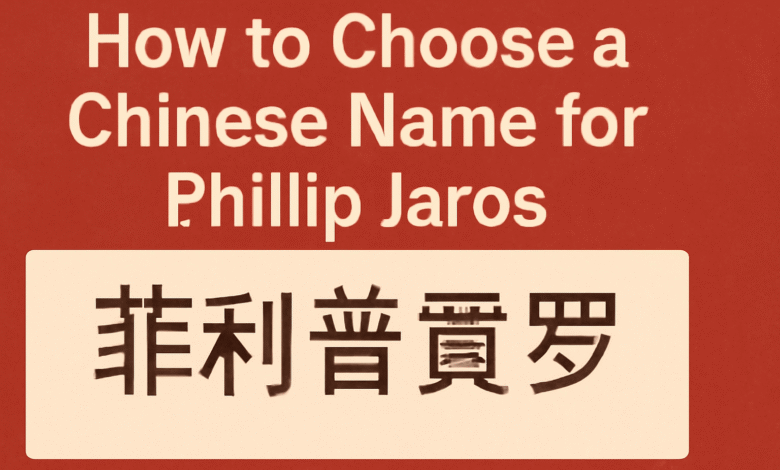How to Choose a Chinese Name for Phillip Jaros

Choosing a Chinese name is a significant and thoughtful decision, particularly for those seeking a meaningful way to connect with Chinese culture. Whether for business, travel, or personal expression, adopting a Chinese name offers the opportunity to embrace a rich tradition of linguistic and cultural significance. If you’re considering a Chinese name for “Phillip Jaros,” there are several factors you must take into account, including phonetics, meaning, and cultural nuances.
In this article, we’ll explore how to select the best Chinese name for Phillip Jaros by breaking down the process into easily understandable steps. From phonetic translation to selecting meaningful characters, this guide will give you all the tools needed to make an informed and thoughtful choice.
The Basics of Chinese Naming Conventions
Understanding the basics of Chinese naming conventions is essential for the entire process. Chinese names differ from Western names in structure, tone, and meaning. A typical Chinese name consists of three parts: the surname (family name), the given name, and occasionally a generational name. This structure differs from the typical Western practice, where the given name comes first, followed by the family name.
Surname (Family Name)
In Chinese culture, the family name (or surname) is usually a single character, and it comes first. There are over 100 common Chinese surnames, but some of the most common include Zhang (张), Li (李), Wang (王), and Chen (陈). If you’re choosing a Chinese name for Phillip Jaros, you can either select a commonly used surname or one that holds particular significance to you.
Given Name
The given name in Chinese is often composed of one or two characters. Each character is chosen not only for how it sounds but for its meaning as well. Chinese names are rich with cultural significance, and the characters used in the given name often reflect the parents’ hopes or values. When selecting a given name, it’s important to consider both phonetics and the symbolic meaning of the characters.
Phonetic Translation of “Phillip Jaros” into Chinese
The first step in choosing a Chinese name for Phillip Jaros is transliterating the name. This means finding Chinese characters that represent the sounds of the name in Mandarin Chinese while ensuring the name still carries appropriate meaning and doesn’t create negative connotations.
Translating “Phillip”
The name “Phillip” doesn’t have an exact Chinese equivalent, so it must be transliterated phonetically. The most common Chinese transliteration for Phillip is 菲利普 (Fēi lì pǔ).
-
菲 (Fēi) represents the “Ph” sound, and it means “fragrant” or “luxuriant.”
-
利 (Lì) is a common character for “li,” and it means “benefit” or “sharp.”
-
普 (Pǔ) conveys the “p” sound and means “universal” or “common.”
The combination of these characters sounds similar to “Phillip” and carries positive meanings of fragrance, benefit, and universality, making it a suitable option for the name.
Translating “Jaros”
Translating the surname “Jaros” into Chinese requires the same process of phonetic approximation. The closest phonetic match for “Jaros” in Mandarin Chinese would be 贾罗斯 (Jiǎ luó sī).
-
贾 (Jiǎ) is a common surname and represents “to sell” or “merchandise.”
-
罗斯 (Luó sī) is a transliteration for “Ros” and doesn’t carry a particular meaning but is often used to represent the sound “ros” or “roses.”
The name 贾罗斯 (Jiǎ luó sī) sounds close to “Jaros” and remains culturally neutral, as it does not carry any negative meanings.
Selecting the Right Chinese Given Name
Once the surname and phonetic transliteration are decided, the next step is selecting a meaningful and suitable given name. A given name in Chinese often reflects one’s virtues, aspirations, or characteristics. The key is to choose characters that not only sound good but also convey positive meanings.
Characteristics and Values to Reflect in the Given Name
Chinese given names are rich in meaning, and the characters chosen often carry deep symbolic weight. When choosing a Chinese name for Phillip Jaros, think about the qualities you want to convey. Do you want your name to represent strength, intelligence, kindness, or perseverance? Here are some suggestions for Chinese characters that might suit the given name:
Strength and Resilience
-
坚强 (Jiān qiáng): meaning “strong and resilient.” If you want the name to reflect inner strength and perseverance, this would be an excellent choice.
-
力 (Lì): meaning “power” or “strength.” A simple yet powerful character, representing both physical and mental strength.
Wisdom and Intelligence
-
聪明 (Cōng míng): meaning “intelligent” or “clever.” If you wish to highlight intelligence or sharpness in your name, this would be a perfect option.
-
智 (Zhì): meaning “wisdom” or “intelligence.” A single character with great significance, it conveys a deep understanding and insight.
Ambition and Vision
-
远 (Yuǎn): meaning “distant” or “far-reaching.” This character can symbolize ambition and a long-term vision.
-
宏 (Hóng): meaning “grand” or “magnificent.” It signifies someone with lofty aspirations.
These characters could be combined to create a meaningful name. For example, 菲力 (Fēi lì) could mean “grace and power,” while 菲远 (Fēi yuǎn) might imply “grace and ambition.”
Understanding Chinese Tones and Flow
When creating a Chinese name, the tonal quality of each character is also essential. Mandarin Chinese has four primary tones, and the tone of each character can significantly affect its meaning. For example, a character pronounced with a high tone may have one meaning, while the same character pronounced with a falling tone may have an entirely different meaning.
The name should also flow naturally, meaning that the tones of each character should complement one another. If a name sounds harsh or jarring when spoken, it can detract from its elegance or significance.
In the case of 菲利普 贾罗斯 (Fēi lì pǔ Jiǎ luó sī), the tones are balanced in a way that makes the name sound pleasant and easy to pronounce. Additionally, the characters themselves don’t have any harsh tones, which ensures that the name has a smooth, harmonious sound.
Cultural Significance and Avoiding Negative Associations
In Chinese culture, the meaning behind a name is highly important. Choosing characters that are auspicious or positive is crucial to ensure the name reflects well on the individual. It’s important to be aware of certain characters that may have negative connotations or unintended meanings.
Before finalizing a name, it’s a good idea to consult with native Chinese speakers or someone well-versed in Chinese naming customs. They can help you navigate the nuances of character selection and ensure that your name aligns with cultural traditions. For example, you may want to avoid characters that have unfortunate meanings or those that could be easily misunderstood.
Testing Your Name
Once you’ve settled on a Chinese name, it’s important to test it in real-life contexts. Introduce the name to Chinese-speaking friends, colleagues, or even native speakers to get their feedback. Pay attention to how the name is pronounced, whether it’s easy to remember, and whether it carries the intended meaning.
Chinese speakers might offer insights on pronunciation nuances or suggest alternative characters that could improve the overall sound and meaning of your name. Taking the time to refine your name with input from native speakers can ensure that it’s both culturally appropriate and personally meaningful.
Read also: Transphotonen: The Future of Quantum Photonics and Its Impact on Technology
Conclusion
Choosing a Chinese name for Phillip Jaros is a thoughtful and meaningful process that requires careful consideration of phonetics, character meanings, cultural significance, and tonal flow. By following these steps and seeking guidance from native speakers, you can select a name that not only sounds great but also reflects positive traits, values, and aspirations. A well-chosen Chinese name can serve as a bridge between cultures, allowing you to connect more deeply with Chinese-speaking communities while embracing the beauty and depth of the Chinese language.



